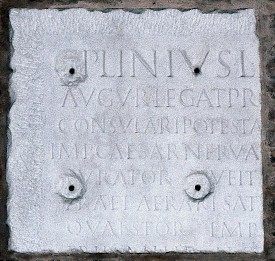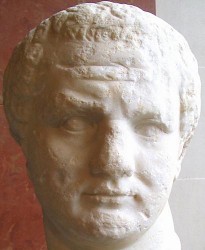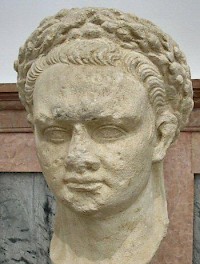Pliny the Younger (2)
Pliny the Younger or Gaius Plinius Caecilius Secundus (62-c.115): Roman senator, nephew of Pliny the Elder, governor of Bithynia-Pontus (109-111), author of a famous collection of letters.

At the end of his life, Pliny founded a bath-house in his home town Como. As was usual in his age, the building inscription was made as long as possible, because in that way the founder could show that he was able to read and write, prestigious talents. Therefore, Pliny mentioned all offices he had occupied. From this text, which you can read here, we can deduce the main stages of Pliny's career: magistrate on the Board of Ten; tribune of the Third Gallic Legion; commissioner of the Roman knights; quaestor of the emperor; tribune of the people; praetor; prefect of the military treasury; prefect of the treasury of Saturn; curator of the bed and banks of the Tiber and sewers of Rome; legatus Augusti pro praetore consulari potestate for the province of Pontus and Bithynia; augur; consul.
The very first step of his public career is not mentioned. When he was eighteen years old (in 80), he spoke as the lawyer of one Junius Pastor at the Centumviral Court, which dealt with wills and inheritances. Many years later, he recalled:
I was very young at the time and I was about to plead in the Centumviral Court against men of great political influence, some of them also friends of the emperor; any one of these considerations could have shaken my resolve [...], but I carried on, believing that "the best and only omen is to fight for your country". I won my case, and it was that speech which drew attention to me and set me on the threshold of a successful career.note

One year later (in 81), Pliny was member of the Board of Ten, which presided over the Centumviral Court. Probably, he was not only elected because he had made a remarkable speech, but also because he had influential friends: Verginius Rufus was one of them, and another one was the emperor, Titus, who had been a close friend to Pliny's uncle and may have felt that he owed something to his friend's adoptive son.
In the Roman world, all careers were always more or less the same. (This pattern is called cursus honorum.) An ambituous young man was supposed to see all branches of Roman government; the Romans did not appreciate specialism, but preferred, to use the modern expression, maximum employability. The shared presidency of the Centumviral Court was a traditional beginner's function, and so was the next step in Pliny's career: he had to make his tour of duty (82). Because he belonged to the wealthy equestrian class, he served as a military tribune, which means that he had an administrative function. His legion was III Gallica, which was stationed in Syria, probably at Raphanaea, halfway Antioch and Damascus - cities Pliny must have visited. His only feat of arms was the exposure of malversations among the auxiliary units.

On his return, contrary winds forced him to stay at Icaria, one of the islands in the Aegean Sea. Here, he decided to write some poetry with the sea and the island as theme (now lost). Perhaps he also visited his former teacher Nicetes of Smyrna, who lived just around the corner. Pliny must have taken some time to visit the Greek towns around the Aegean, which was a normal holiday. The Romans still admired the Greeks.
According to the inscription, he became Commissioner of the Roman knights, an office that we do not really understand. It cannot have been very important to Pliny's career. In Syria, he had shown that he was a good accountant, and this was a very rare talent in the Roman world. (You understand why if you multiply the sum of MDCIV and CCLIV with the quotient of MDCLXVII and MLXI.) When Pliny was candidate for the office of quaestor, a financial office, he was supported by the emperor Domitian, who had in the meantime succeeded his brother Titus.
When he was twenty-eight, in 90, Pliny served as quaestor. If he had died at this moment, it would have been a brilliant career. His father and his uncle had been knights, but Pliny was now a senator. Of course there were several ranks in the Senate (former quaestors, former praetors, former consuls...) and Pliny belonged to the least important senators, but nevertheless: he was a senator, and he was allowed to wear a toga with a broad purple edge. In the recently-built Colosseum, Pliny was seated on the first rank. However, this was only the beginning of a brilliant career.